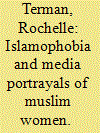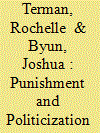| Srl | Item |
| 1 |
ID:
157348


|
|
|
|
|
| Summary/Abstract |
This article examines portrayals of Muslim women in US news media. I test two hypotheses derived from theories of gendered orientalism. First, US news coverage of women abroad is driven by confirmation bias. Journalists are more likely to report on women living in Muslim and Middle Eastern countries if their rights are violated but report on women in other societies when their rights are respected. Second, stories about Muslim women emphasize the theme of women's rights violations and gender inequality, even for countries with relatively good records of women's rights. Stories about non-Muslim women, on the other hand, emphasize other topics. I test these hypotheses on data from thirty-five years of New York Times and Washington Post reporting using a structural topic model along with statistical analysis. The results suggest that US news media propagate the perception that Muslims are distinctly sexist. This, in turn, may shape public attitudes toward Muslims, as well as influence policies that involve Muslims at home and abroad.
|
|
|
|
|
|
|
|
|
|
|
|
|
|
|
|
| 2 |
ID:
185009


|
|
|
|
|
| Summary/Abstract |
Conventional wisdom treats politicization in the international human rights regime as invariant: for any given violation, states condemn adversaries while coddling friends. However, we find that politicization patterns vary markedly across human rights issues. Some norms are more politicized than others, and states are more likely to punish geopolitical partners on certain violations. We offer a novel theory of politicized enforcement wherein states punish human rights violations discriminatively based on their perceived “sensitivity” for the target state. Using data from the UN Universal Periodic Review, an elaborate human rights mechanism, we show that states tend to criticize their adversaries on sensitive issues that undermine the target regime’s power and legitimacy while addressing safer topics with friends. By uncovering a strategic logic of human rights enforcement, this research contributes new theoretical insights on the relationship between norms and power politics in global governance.
|
|
|
|
|
|
|
|
|
|
|
|
|
|
|
|